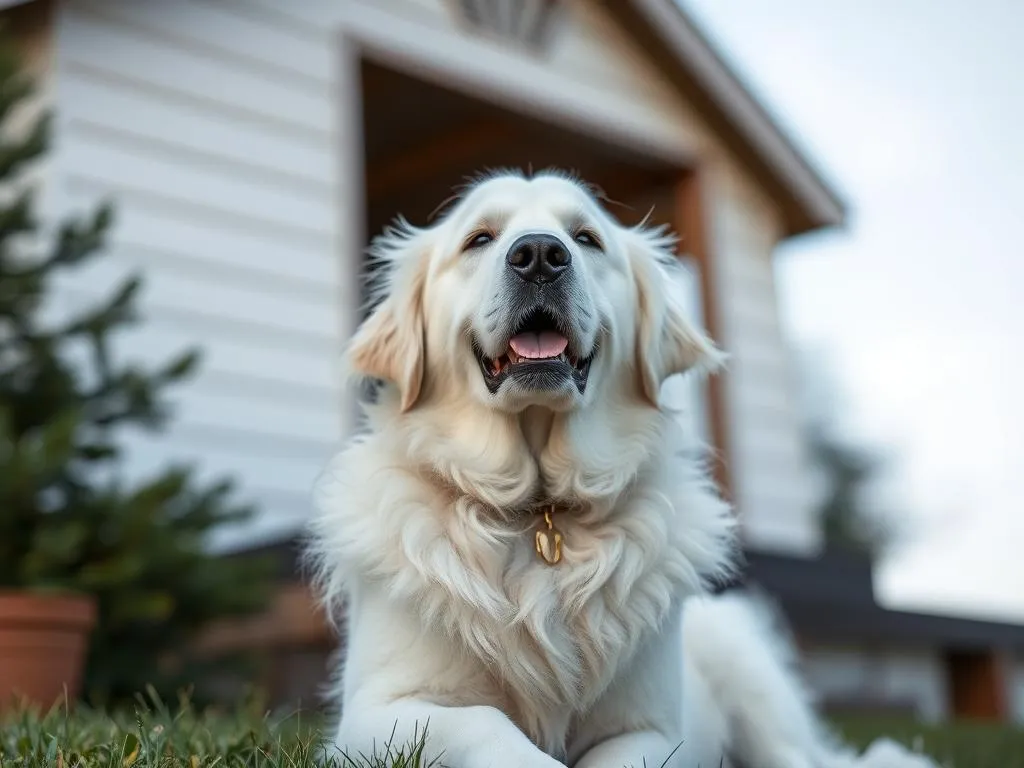
Great Pyrenees, known for their majestic appearance and gentle demeanor, have been beloved companions for families for centuries. As a breed that is both protective and affectionate, many potential dog owners wonder, are Great Pyrenees good with kids and families? Understanding this breed’s characteristics is essential for assessing their suitability in a family setting.
Understanding the Great Pyrenees Breed
History and Origin
The Great Pyrenees, or Pyrenean Mountain Dog, hails from the mountainous regions of France and Spain, where they were originally bred as livestock guardians. Their primary role was to protect sheep from predators such as wolves and bears. This history has imbued the breed with a strong guarding instinct and a natural affinity for protecting its family and territory.
Physical Characteristics
The Great Pyrenees is a large dog, typically weighing between 85 to 115 pounds and standing about 25 to 32 inches tall at the shoulder. Their thick, double coat is primarily white but can include shades of gray, badger, or tan. This impressive coat not only provides insulation against cold weather but also serves as a barrier against the elements, making them well-suited for outdoor living.
Temperament
Great Pyrenees are known for their gentle disposition and calm demeanor. They are generally affectionate and loyal, often forming strong bonds with their families. Their protective nature makes them vigilant watchdogs, while their patient temperament allows them to be wonderful companions for children.
Great Pyrenees and Children
General Attitude Toward Children
Are Great Pyrenees good with kids and families? The answer is often a resounding yes! These dogs typically exhibit a friendly disposition towards children. They are known for their playful interactions, often engaging in gentle play. Many families report heartwarming stories of their Great Pyrenees being affectionate companions to their little ones.
Protective Instincts
One of the most notable traits of the Great Pyrenees is their strong protective instinct. This breed is naturally inclined to guard their family and home. For families with children, this can be a significant advantage. The dog’s instinct to protect can create a sense of safety for kids, as the Great Pyrenees will often be alert to any potential threats and act accordingly.
Compatibility with Different Age Groups
Great Pyrenees generally adapt well to children of various ages. They can be especially gentle with toddlers, often displaying a nurturing side. However, parents should supervise interactions, particularly with very young children, as the dog’s large size can unintentionally lead to accidents. As kids grow older, they can enjoy more active play and companionship with their Great Pyrenees, reinforcing a strong bond.
Training and Socialization
Importance of Early Training
Early training is crucial for any family pet, and the Great Pyrenees is no exception. Training helps establish boundaries and encourages good behavior, making it easier for the dog to integrate into family life. Techniques such as positive reinforcement and consistency in commands are highly effective with this breed.
Socialization with Children
Introducing a Great Pyrenees to children should be a gradual process. Start by allowing the dog to observe children from a distance, gradually shortening that distance as the dog becomes more comfortable. Socialization should encompass various environments, sounds, and people to ensure the dog is well-adjusted and friendly towards kids.
Behavioral Challenges
While Great Pyrenees are generally good-natured, they can exhibit some behavioral challenges, such as stubbornness and independence. Addressing these challenges in a family setting requires patience and consistency. Engaging professional trainers can also be beneficial in guiding families through specific behavioral issues.
Living with a Great Pyrenees as a Family Pet
Space Requirements and Environment
Great Pyrenees are large dogs that thrive in spacious environments. They are best suited for homes with yards, where they can roam and play. Apartment living is not ideal for this breed, as they require ample space to move around and explore. A secure fenced yard is essential to keep them safe, especially given their natural guardian instincts.
Exercise Needs
Daily exercise is vital to keep a Great Pyrenees healthy and happy. These dogs enjoy long walks, playtime in the yard, and engaging activities that stimulate their minds. Families can participate in fun outdoor games with their Great Pyrenees, such as fetch or agility training. Regular exercise not only keeps the dog fit but also helps in forming strong family bonds.
Grooming and Maintenance
The Great Pyrenees has a luxurious thick coat that requires regular grooming. Weekly brushing is essential to prevent matting and reduce shedding. During shedding seasons, more frequent brushing may be necessary. Additionally, routine health checks, including ear cleaning and nail trimming, should be part of their care regimen. While grooming may require a time commitment, the rewards of having a well-cared-for Great Pyrenees are immense.
Benefits of Great Pyrenees for Families
Companionship and Loyalty
The bond that forms between a Great Pyrenees and a family is often profound. These dogs are incredibly loyal to their families, providing companionship and emotional support. Many families report feeling a sense of security and love from their Great Pyrenees, which enhances the overall family dynamic.
Teaching Responsibility to Children
Having a Great Pyrenees can be an excellent opportunity for children to learn responsibility. Tasks such as feeding, grooming, and walking the dog can be age-appropriate chores that teach kids about commitment and care. These experiences foster a sense of ownership and empathy towards animals, crucial traits for children’s development.
Potential Concerns and Considerations
Allergies and Health Issues
Like any breed, Great Pyrenees can be susceptible to certain health issues, including hip dysplasia and heart problems. Families with children should be aware of these potential concerns and consult with a veterinarian to ensure a healthy lifestyle for their pet. Additionally, while Great Pyrenees are not hypoallergenic, their coat can produce dander that may trigger allergies in sensitive individuals.
Time Commitment
Owning a Great Pyrenees requires a significant time commitment. Training, socialization, exercise, and grooming are essential aspects of their care that families must prioritize. It’s essential for potential owners to evaluate their lifestyle and ensure they can dedicate the necessary time to properly care for this breed.
Cost of Ownership
The cost of owning a Great Pyrenees can vary significantly. Families should budget for food, regular veterinary check-ups, grooming supplies, and potential health care costs. While the initial investment in adopting or purchasing a Great Pyrenees can be substantial, the love and companionship they provide can be invaluable.
Conclusion
In conclusion, the Great Pyrenees is often an excellent choice for families with children. Their gentle demeanor, protective instincts, and ability to form strong bonds make them wonderful companions. However, potential owners should carefully consider their lifestyle, living situation, and ability to commit time and resources to the care of this breed. By taking these factors into account, families can make an informed decision about welcoming a Great Pyrenees into their home.
With proper training, socialization, and love, Great Pyrenees can thrive as cherished family members, enhancing the lives of everyone in the household.









